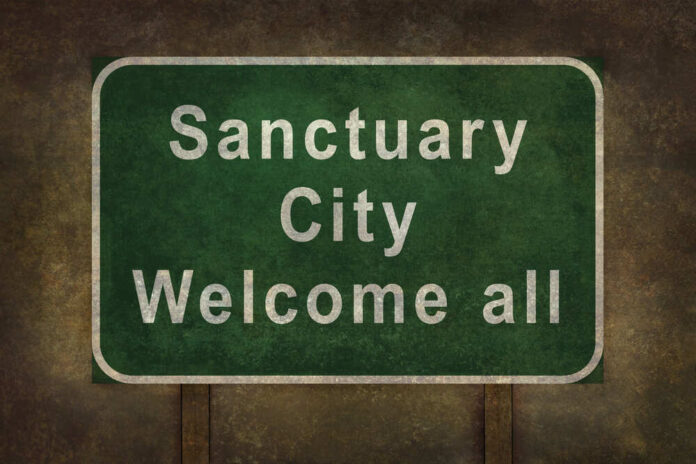
Former President Donald Trump vows to abolish sanctuary cities and restore law and order if re-elected, sparking debate on immigration policies and public safety.
At a Glance
- Trump pledges to end sanctuary cities and prioritize law enforcement if re-elected
- Previous attempts to cut funding to sanctuary cities were blocked by federal judges
- The term “sanctuary city” lacks a clear legal definition, complicating enforcement efforts
- Debate continues over the constitutionality and effectiveness of sanctuary policies
- Trump’s stance on immigration remains a central issue in his campaign
Trump’s Renewed Pledge to End Sanctuary Cities
Former President Donald Trump has once again taken a firm stance on immigration, vowing to abolish sanctuary cities and restore law and order if re-elected. During a women’s town hall hosted by Fox News’ Harris Faulkner, Trump addressed a question from an attendee named Nancy, whose son was tragically murdered by an undocumented immigrant. Trump expressed his determination to end sanctuary policies, stating he would utilize executive orders and the Aliens Act of 1798 to dismantle these jurisdictions.
Trump’s renewed focus on sanctuary cities echoes his previous attempts to crack down on jurisdictions that limit cooperation with federal immigration authorities. However, his earlier efforts faced significant legal challenges, with federal judges blocking attempts to cut funding to these cities.
The Complexity of Sanctuary Cities
One of the main challenges in addressing sanctuary cities is the lack of a clear legal definition. The term “sanctuary city” varies in interpretation and implementation across jurisdictions, making it difficult to create a uniform policy. Some cities avoid holding individuals for Immigration and Customs Enforcement (ICE) due to legal concerns, such as potential lawsuits for illegal detention. Others may cooperate with federal authorities in cases involving serious criminals but not for minor offenses.
Legal Challenges and Public Safety Debate
Trump’s previous attempts to punish sanctuary cities faced significant legal hurdles. In 2017, a California judge issued a nationwide injunction blocking Trump’s executive order to cut funding to these jurisdictions. The judge ruled that the cities were likely to succeed in their challenge, arguing that the order was unconstitutional and violated local sovereignty.
Supporters of sanctuary policies argue that they enhance public safety by encouraging cooperation between immigrant communities and local law enforcement. Research indicates that undocumented immigrants are less likely to commit serious crimes than US-born individuals. However, critics like Sheriff Chuck Jenkins advocate for more cooperation with ICE, arguing that sanctuary policies hinder law enforcement efforts and potentially endanger public safety.
Trump’s Strategy and Future Challenges
If re-elected, Trump has stated he would use executive orders and the Aliens Act of 1798 to dismantle sanctuary jurisdictions. However, the effectiveness and legality of such measures remain uncertain. The debate over the constitutionality and appropriateness of local law enforcement’s involvement in immigration enforcement continues to be a contentious issue.
As the 2024 election approaches, Trump’s stance on immigration and sanctuary cities remains a central issue in his campaign. The ongoing debate highlights the complex interplay between federal immigration policies, local law enforcement practices, and constitutional rights, ensuring that this topic will continue to be a focal point in American politics.
Trump says he can end sanctuary cities with an executive order.
“ “You can do it with the Aliens Act of 1798. We can move them out of the cities.” #GaPol #Election2024 pic.twitter.com/PWJBCLPLyb
— The Atlanta Voice (@theatlantavoice) October 16, 2024














